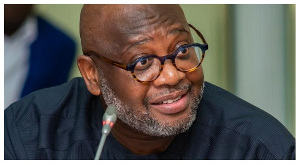.... Petty Conflicts & Pretence - PART 1
By Robert Viliam Baiden
Travelling from the Australian continent through Asia to Europe all the way around north & south America and back to the African continent, you will encounter Ghanaian communities disunited and beset by petty quarrels, gossiping, backbiting, ungrateful & envious behaviour and unwilling to help and support each other. You will also notice most Ghanaians are very selfish, unforgiving and jealous of one another and are constantly engaged in undesirable competition among themselves. Few enlightened Ghanaians are turning their eyes back towards Ghana to analyse the root causes of this detrimental culture of petty conflicts and pretence. Back home in Ghana, one discovers that Politicians, policy makers, opinion leaders and town chiefs in Ghana are in the “business” of quarrelling and training other disciples to spread their gospel of petty conflicts and pretence among its Ghanaian citizens. Ghana has become a big “factory” of well trained extremely oversensitive, quarrelsome & pretentious “workers” churning out bountiful offspring of litigants and petty minded children. Petty conflicts and pretence permeates the whole society and culture in Ghana - between friends, husband and wife, children and their parents, employer and employee. Fights exist between communities and hatred could be found between different tribes. Instead of focusing on building and improving Ghana’s infrastructures in the health, educational, economic and social sectors our politicians & leaders are engaged in petty controversy and confrontation with one another and encourage others to do likewise whiles holding its citizens in ignorance and disunity to enable them exploit and plunder the nation’s resources.
Listening to Ghanaian radio stations and reading the newspapers one acknowledges the overwhelming barrage of cheap gossip, petty quarrels, contradictory statements, accusations and counter- accusations. Below are some top events and topics that make our daily headlines in Ghana:
Angry foot soldiers fight over food in Parliament, all die be die – Nana Addo, These Self-seeking Ghanaian Politicians Again?, Ex-president's award blasted, Mills 'Hangs' Nana Addo, Mills apologises for 'snubbing' Kufuor,CJ, Anas Lies On ‘Enemies Of The State’ Against The Catalyst, Did gov't support Anas? - Kwetey says "no", Ablakwa says "yes", Mills complains too much - Bomfeh, Don’t Get Angry, Reform - Nduom.
Of course, this occurrence of disputes, misunderstandings, fights, difference of opinions etc are just common human traits but Ghanaians seem to be experts at turning a small issue into a very complicated problem. They consider such childish, cheap and flimsy causes as premise to start a big quarrel like – she gave me down - he ate my food- she eyed me - he says he loves me – she didn’t greet me – he farted on me – I dreamt she hates me – he thinks I am cheap – she juju me- and the list goes on and on. We possess a tradition of being mean spirited and ungenerous in trifling things, cheap in our attitudes towards each other. Our ideas and interests in other people are narrow and always “ reading into” what others say and think of us as negative and then pretend we are open-minded, understanding, all forgiving and religious.
Among west Africans, Ghanaians think of themselves as most receptive to new ideas, unprejudiced, approachable and unbigoted. Read the comments after any story in our newspapers and you will discover the very opposite. Back in Ghana our pastors and religious leaders tell us that we are the most warmest, friendliest and sociable beings on the planet and therefore our mission is to teach the world ethics on how to be sociable and peaceful with others. How pretentious, ridiculous and misleading can this sound!! Whenever and wherever you meet Ghanaians, in the Americas, Asia, Europe and even in Ghana itself they always have petty grievances against each other and would not like to have anything to do with one another. A recent research on behaviours of different ethnic groups in Europe revealed that Ghanaians are prominent in reporting one another to the police about the undocumented in their communities so that these illegal aliens could be deported back to Ghana. As a child growing up in Ghana, I saw my uncles quarrelled with my dad over food, my aunties quarrel over who is more well dressed, members of family fight over which of them is more educated and wealthy. These bickering continued until they declared each other arch-enemies or accused one another of being devils and witches. This seed of hatred is passed on to succeeding generations. Furthermore, I observed the same phenomena among my neighbours, in the communities around me; even churches are involved in quarrels and on national level. A part of our traditions has taught us to be tribalistic, suspicious, oversensitive, quarrelsome, discriminative, bigoted and think of ourselves as always better than others. We then camouflage these vices with pretence of honesty, friendliness, openness, humility etc. In short, our culture has turned us into hypocrites and we have become a people of petty minds.
Presently, Ghana is stable but it is surrounded by unstable countries in the region like Togo, Ivory coast, Burkina Faso etc. Most often, civil wars and conflicts have their origins in the manipulation by the elites of the differences between members of their society. This orientation whereby the political elites in Ghana promote and encourage quarrels, fights, litigation and petty mindedness of its Ghanaian citizens is a very dangerous trend and all Ghanaians who truly love the country should be bothered. How do we rid ourselves of this pettiness of mind? What is driving this contentious politicians both in the past and present to “sow seeds of discord” among its own citizens? Why have Ghanaians become such a quarrelsome and cantankerous folks right from the bottom levels of society to the top?
How and when did this spirit of contention become endemic and so entrenched in our culture? These are serious and disturbing questions that should be asked by all Ghanaians. Almost all Ghanaians I know from all over the world that helped their fellow countrymen in time of need ended up being demonised by those they helped. Also, countless foreign nationals from both within Ghana and abroad complain about helping Ghanaians who initially pretended to be very humble and deserved assistance until they got what they wanted and then turned against their helpers. Instead of showing gratitude and appreciation, Ghanaian individuals who were helped made this charitable people who assisted them felt that they had been fooled and outsmarted. As if to say literally to their helpers - “you are a fool for helping me and thinking that I deserved your support”.
This self-centered, demanding and unthankful group of Ghanaians perceive benevolence, compassion and generosity as weakness. First, an individual tells a pathetic and heartbreaking story in order to evoke a sympathetic feeling in the helper and then use a mix of manipulation, seduction, deception and persuasion to acquire the intended benefit. “Panfu Respect” (faking respect and sweetness of character in order to attract attention) is employed especially by extremely poor Ghanaians from simple backgrounds in order to get what they want, and then they deliberately create a scenario to antagonise and embarrass their helpers. The perpetrators then shift all the blame of the fracas between them on their one-time friend and helper forcing these generous people to go on the defensive once the deception is discovered (most often too late). The victims are then left behind feeling like an imbecile and a fool. Both the helper and the beneficiary are doomed to be at loggerheads and in a quarrel or contentious mind frame. The Ghanaian rewards goodness with contention and pretence, always taking but never giving and back home in Ghana that is the coolest thing to do nowadays. Ingratitude mentality has triumphed over sympathy, compassion and helpfulness. Countless gracious, kind-hearted and truthful Ghanaians whom I heard of and known from Nkrumah’s time to the present era ended up either impoverished or being declared enemies of the state. The dubious & hypocritical actions of these Ghanaian con-men & women seeking help therefore have a “sugar coating and a poison center”.
Other generous Ghanaians are marginalised to the fringes of society or coerced to escape to foreign countries in order to preserve their dignity and integrity. In fact, Africans are notoriously known for silencing the good citizens in their mist to the point of almost extinction. Dealing with Ghanaians from all walks of life has provided numerous testimonies that nearly all Ghanaians have suspicions and distrust for each other. They are not transparent in their actions and communications. They pretend to need one thing but actually require something else and they say something but apparently mean a different thing. This is the cantankerous tradition and customs that almost all Ghanaians were nurtured in. It is usually said that “when an African sees white he says it is black” and a common saying exist that “Ghanaians do not trust themselves”. A Ghanaian would rather trust a stranger than his own brother or sister. Yet another motto is “wherever black man dey suffer suffer dey there too much”. This is a pathetic and lamentable condition!!
Could our elders have contributed to the propagation and entrenchment of this primitive & backward human trait called pretence & petty quarrelling? Why do Ghanaians have a quick inclination to betray and backstab one another? Why can’t most Ghanaians distinguish between constructive and negative advice or accept correction? Who led us Ghanaians to think we are beyond criticism? What drives us to always reject correction in order to “save face” at the expense of truth? When Ghanaians encounter other people from another race anywhere in the world, they show such low self-esteem and distrust anything that is good in themselves. Has this pettiness behaviour of Ghanaians its roots in the legacy of colonialism or is it some sinister influence of our own culture in our upbringing? Any individual who sees most of the movies from Ghana and Nigeria would testify how cheap and petty the stories are – full of quarrels, fights, juju & voodoo, materialistic & shallow, suspicions, wicked and stupid themes. Most Africans see these films, both rich & poor, educated & ignorant, adults & children. Sadly, these African films depicts the reality on the ground and illustrates how degenerated and cheap the culture in Ghana has become. The land has become a place where loud-mouthed quarrelsome individuals are respected and most of them are highly educated and dishonest characters who live extravagant lifestyles like wealthy drug lords.
It is these swindlers, juju-believing, and deceitful Ghanaian men and women who are setting the trend in the country today and some of them occupy high policy making positions and are very influential in the society. Being mean, unforgiving, materialistic, selfish and antagonistic is the reigning fashion in Ghana today. Most people in Ghana presently go to school in order to know the loopholes within the system so they can dupe and cheat their own folks when they start working. Without wanting to sound idealistic, an honest person does not stand a chance of surviving in Ghana this present time because it would mean joining the trendy wicked & corrupt culture.
Author: Robert Viliam Baiden, NDC Netherlands
Source: NDC Europe
Opinions of Monday, 14 March 2011
Columnist: Baiden, Robert Viliam


















